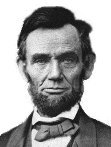

Everybody already knows many stories about Abraham Lincoln, but a surprising number of them are simply untrue. For example, it is common knowledge that he was born in a dirt-floored log cabin in the backwoods of Kentucky, and you can visit all sorts of log cabins that people claim to be it. Actually, the real one doesn't exist anymore. It was completely destroyed by fire in about 1840. Also, although his family was poor, everybody in the neighborhood was poor. His family was relatively well off, they were actually in the top 15% income bracket for their county.
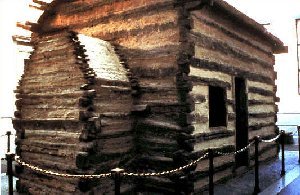 Reconstruction of Lincoln Log Cabin |
Although it was true that Lincoln only attended school for one year, he was an avid over-achier who taught himself how to read and write, then read everything he could lay his hands on. He was driven to educate himself. If he could have gone to school he would have, but his family couldn't afford it.
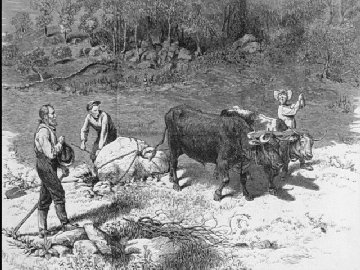 Farming in Kentucky |
Lincoln was hard working, and didn't expect much in pay. For example, his father hired him out to split fence rails for a neighbor, Mrs. Miller. She couldn't pay him in money, but instead, paid him with cloth for trousers. Every four hundred rails earned him a yard of cloth for his jeans. That's how he got the nickname of "The Rail Splitter."
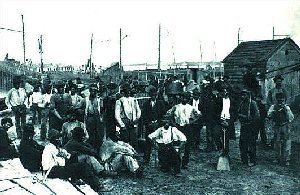 Slaves on New Orleans Dock |
When Lincoln was 19 he was hired by a local businessman, Denton Offutt, to help take a cargo of hogs and corn by flatboat down the Ohio and Mississippi Rivers to New Orleans. In New Orleans, Lincoln got his first real look at slavery, and he is reported to have said, "If ever I get a chance to hit that thing, I'll hit it hard." Lincoln did grow to hate slavery, but he never made that often-quoted statement. More people have put words into Lincoln's mouth than he ever did.
"You can fool all the people some of the time and some of the people all the time, but you can not fool all the people all the time."
"I don't know who my grandfather was, but I am very concerned to know what his grandson will be."
"God must have loved the common people; he made so many of them."
"I am not bound to win, but I am bound to be true."
"I have never known a worthwhile man who becomes too big for his boots or his Bible."
"I have a congenital aversion to failure..."
Denton Offutt hired Lincoln to help work in his store when they returned from New Orleans and this was where Lincoln got his second nick-name. A man overpaid Lincoln four cents and was gone before Lincoln noticed the mistake. Before Lincoln went home that night he walked four miles to give the man back his four cents. Things like that eventually earned him the nickname of "Honest Abe," a nick-name he hated. He hated the name "Abe." Nobody who knew him called him Abe! In fact, his future wife Mary Todd always called him "Mr. Lincoln" or "Father." When writing to his friends, he signed his name "A. Lincoln." Interestingly enough, Lincoln's honesty didn't help Offutt, his store went bankrupt within a year of hiring Lincoln.
The Black Hawk War broke out in 1832 and Lincoln earned the rank of Captain in the 4th Illinois Regiment, although he did not see any fighting. He later related that once when marching his men he arrived at a narrow gate. Since he couldn't remember the command to make them go through in single file, he "halted" them, "dismissed" them, and then ordered them to reform up on the other side of the gate in two minutes.
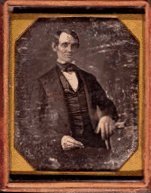 A Young Lincoln |
The story is Lincoln fell madly in love with the "only-girl he ever loved," a girl named Ann Rutledge. But he was timid and took too long asking for her hand. She got sick and died from a fever. Lincoln, crazed with grief, almost took his life. For the remainder of his life, he would have deep fits of depression saying "My heart lies buried there." Actually, most of this never really happened. Ann was a good friend, but hardly a lover. He did, however, have a real relationship with a girl named Mary Owens, and in 1836 asked her marry him, but she turned him down in 1837.
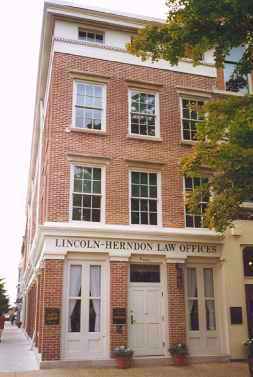 Lincoln-Herndon Law Offices |
Lincoln ran for and was re-elected twice to the State Legislature. He also passed the bar in 1837, and at the age of twenty-eight began a successful law practice. Because Springfield was the new State Capital, Lincoln opened his practice there with a partner named William Herndon, while still continuing to be a member of the State Legislature. By the way, he really did keep important letters and documents inside his hat. He was also very messy. His law partner once found a stack of dusty documents tied in a bundle on top of a book shelf. A note in Lincoln's handwriting read, "When you can't find it anywhere else, look at this."
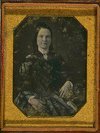 Mary Todd Lincoln |
It was at a Springfield dance that he met his future wife, Mary Todd. Interesting enough, she was dating Judge Stephen Douglas at the time, but chose Lincoln over the brilliant politician. Later, not surprisingly perhaps, Douglas became Lincoln's great political rival.
It is true that Lincoln called off his marriage to Mary Todd at the last moment the first time they tried to get married in 1841. A year later, they finally did get married, however, and eventually they had four sons, three of whom tragically died. Only his oldest son, Robert Todd Lincoln, survived. Robert served as a staff officer during the Civil War, and later became the Secretary of War under President James Garfield (who strangely enough was assassinated in office just like Abraham Lincoln).
The Lincolns lost two of their sons during the Civil War, and it is true that Mary Todd held seances in the White House to try to talk to her dead children, and Lincoln himself reportedly attended at least a few of them. This is not surprising, because Lincoln was very superstitious. He once saw two images of himself in an old mirror. He interpreted that mean that he would be elected to a second term as President, but would not live to complete it. He was correct.
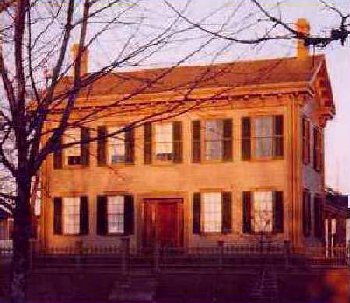 Lincoln's Home in Springfield |
In May of 1844, Abraham and Mary Todd Lincoln purchased a house in Springfield, which they bought for $1500 (hard to beat that price today). The family would have to move again two years later, however, when in 1846 Lincoln was elected to the United States House of Representatives. They sold the Springfield House and moved into a boarding house in Washington DC. The Springfield house was the only house that Lincoln ever owned.
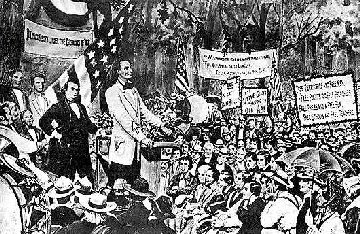 The Lincoln-Douglas Debate |
In 1858, Lincoln began his famous series of debates with Stephen Douglas over the slavery issue. They were both running for the same United States Senate seat. The Lincoln-Douglas Debates sky-rocketed Lincoln into national prominence. His common sense approach to the issues, and his sense of humor appealed to the common people, but the debates were not always on the political issues. Once Douglas sneeringly informed the audience that the first time he had seen Lincoln he was selling whisky in a bar. Lincoln replied that it was true he was bar-tending, but Judge Douglas was on the other side bar-hoping. In 1859, Douglas won the election by 8 votes and went to the Senate little realizing that he had set his opponent on a path to the White House a year later.
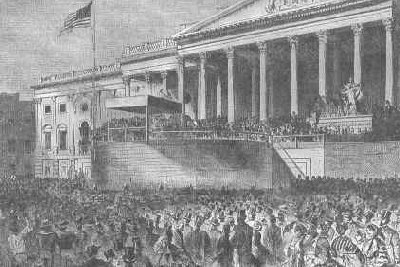 First Inaugural Address - March 4, 1861 |
In May of 1860, because of the fame he had received in the Lincoln-Douglas Debates, Lincoln was chosen by the Republican Party to run against Douglas again, this time for President. Douglas lost the election, and Lincoln became the first Republican to be elected President. During the campaign Lincoln grew a beard. The story that he grew his beard at the suggestion of an eleven-year-old girl is true. The little girl wrote him a letter saying she thought he'd look better that way.
The story that Lincoln had to sneak into Washington for his first inaugural address because of assassination rumors is also true, but he was only smuggled into Washington on a sleeper train under a false name. The stories of him being disguised as a Scotsman complete with plaid cap and kilts, or wearing dark glasses and armed with brass knuckles were all made up by newsmen angry because his plans where kept secret from them. Lincoln was not a popular man, especially among much of the pro-slavery press.
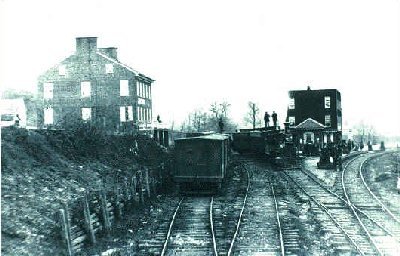 Train station at Hanover Junction where Lincoln stopped before proceeding to Gettysburg. |
The story that Lincoln composed the Gettysburg address on the back of an envelope while on the train to deliver the speech is also not true. It was actually the result of many efforts and rewrites. We have several of the drafts written by Lincoln's own hand. Lincoln also has the reputation of being a great orator, but actually he gave very few speeches as president. He had a high-pitched voice, and actually seemed afraid of saying something offensive, and would usually react by not saying anything at all. For example, when the crowd greeted him at the Gettysburg Railroad Station, he refused to say anything before his address to avoid saying something wrong.
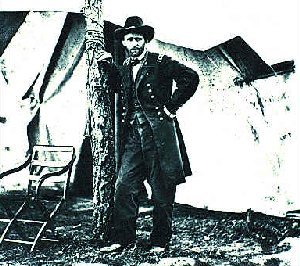 General Ulysses S. Grant |
One of the most famous stories told about Lincoln is his response to complaints about General Grant's drinking. He is credited with saying "If I knew what brand he used, I'd send every other general in the field a barrel of it." He actually never did say this, but it is a great story.
Another favorite story is that when a businessman asked Lincoln for a pass through Union lines to enter Richmond to visit a business acquaint, Lincoln answered with: "I should be very happy to oblige you, but the fact is, I have, within the past two years, given passes to two hundred and fifty thousand men to go to Richmond and not one has got there yet." This is a true example of Lincoln's humor.
Many people believe that even in the darkest days of the Civil War Lincoln was steadfast in his resolve to free the slaves. Nothing can be farther from the truth. Lincoln was walking a political tight rope. He had to keep his powerful abolitionist supporters happy, but was fearful of losing the support of the loyal border states whose economy was still based on slavery. His real resolve was to win the war. He had to balance the support of those who wished to destroy the South with those who were increasingly alarmed by the bloodshed and looked to comprise as a solution to ending the war.
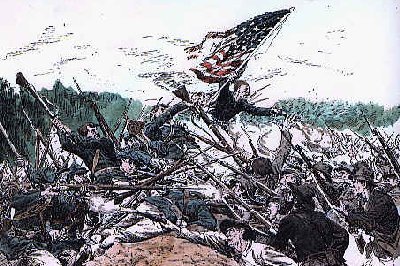 Fierce Hand-to-hand fighting |
As the war continued to cost thousands of lives both sides began to look at ways to get more fighting men. In the North, the famous 54th Massachusetts Volunteers was formed (Made famous in the the movie "Glory"). It was only the first black regiment recruited in the North. However, even though many whites balked at fighting with the blacks, eventually, nearly 200,000 blacks served in the Union army. Without their services, Lincoln acknowledged that the Union armies, reduced by casualties and desertions, might have been forced to negotiate a peace with the Confederacy. In the Civil War, the Union lost 364,511 men against the South's 133,821 dead; in other words, the North lost almost three times the men the South did!
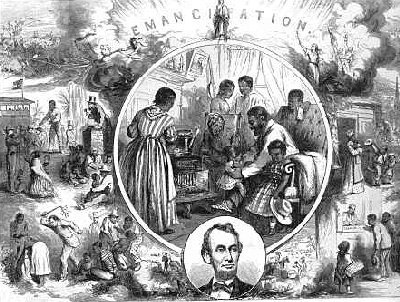 The Emancipation Proclamation |
The biggest myth about Lincoln was that he freed all the slaves. Actually Lincoln never did free all the slaves. The Emancipation Proclamation only proclaimed the slaves in all territories held by the Confederates free, but didn't free any of the slaves in the North. It also did not apply to the border states and their 300,000 slaves. It was just a political move to get support in Europe and to encourage the slaves to rebel and cause trouble in the South.
A little known Civil War fact was that in March of 1865 Confederate President Jefferson Davis notified England and France that the South would abolish slavery in exchange for support. The war ended before he received an answer. After Lincoln's death, it took an Amendment to the Constitution to actually begin the process of giving freedom to everybody. We still seemed to be working on it.
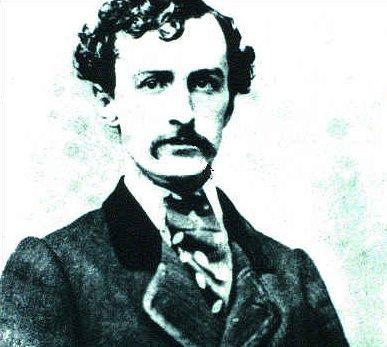 John Wilkes Booth |
John Wilkes Booth was not the first person to try and kill Abraham Lincoln. Twice before he had been shot at. In 1861, while riding alone at night, the President had been shot at by a man standing 40 yards from him. In 1864 he was shot at and the bullet passed through his stovepipe hat. In both cases, Lincoln joked about it and ordered that it not be publicized.
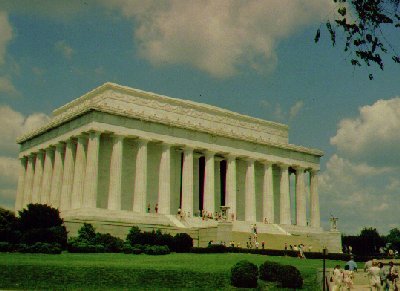 Lincoln Memorial - Washington DC |
The most famous monument to Lincoln is the Lincoln Memorial in Washington DC. Inside is a 19-foot-high marble statue of a seated Lincoln carved by the sculptor Daniel Chester French. Inscribed above the statue are the following words:
AS IN THE HEARTS OF THE PEOPLE FOR WHOM HE SAVED THE UNION THE MEMORY OF ABRAHAM LINCOLN IS ENSHRINED FOREVER |
The monument's designer was Henry Bacon and it took eight years to build. It was finished in 1922. It is today visited by millions of tourists every year, But this is not where Lincoln is buried.
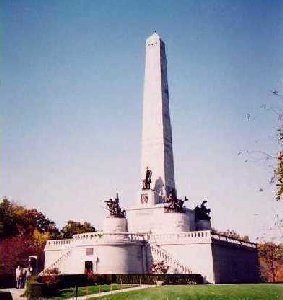 Lincoln's Tomb in Springfield |
His beautiful tomb is located in Springfield, where he lived before becoming our 16th President.
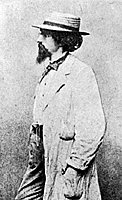 Matthew B. Brady |
Yes, we know what many of the famous people of the Civil War Era really looked like, because the camera had been invented just before the war. In Lincoln's case, it depends from which side of the negative the print was made. Notice that his mole changes sides on the pictures we have of him - it was actually on the left side of his face. Matthew Brady is the most famous photographer of the Civil War. Through his camera's eye the public was first introduced to all the horrors and heroism of modern warfare.
| sources: | "American History Explorer." (Multimedia CD-ROM) Hiawatha, IA: Parsons Technology |
| Davis, Kenneth C. Don't Know Much About the Civil War. New York: Avon Books, 1996. | |
| "Mediasource Historical Library." Volume 1 (Multimedia CD-ROM) Westchester, PA: Applied Optical Media Corp. | |
| "Multimedia U. S. History." (Multimedia CD-ROM) Parsippany, NJ: Bureau of Electronic Publishing, Inc. | |
| Shenkman, Richard. Legends, Lies & Cherished Myths of American History. New York: William Morrow and Company, Inc., 1988 | |
| Shenkman, Richard. "I Love Paul Revere, Whether He Rode or Not!". New York: HarperPerennial, 1991 | |
| Shenkman, Richard and Kurt Reiger. One-Night Stands with American History. New York: William Morrow and Company, Inc., 1980. | |
| "The American Memory" at: http://memory.loc.gov | |
| "The History Place" at: http://www.thehistoryplace.com | |
| Thomas, Lowell. The Vital Spark. New York: Doubleday & Company, inc., 1959. |